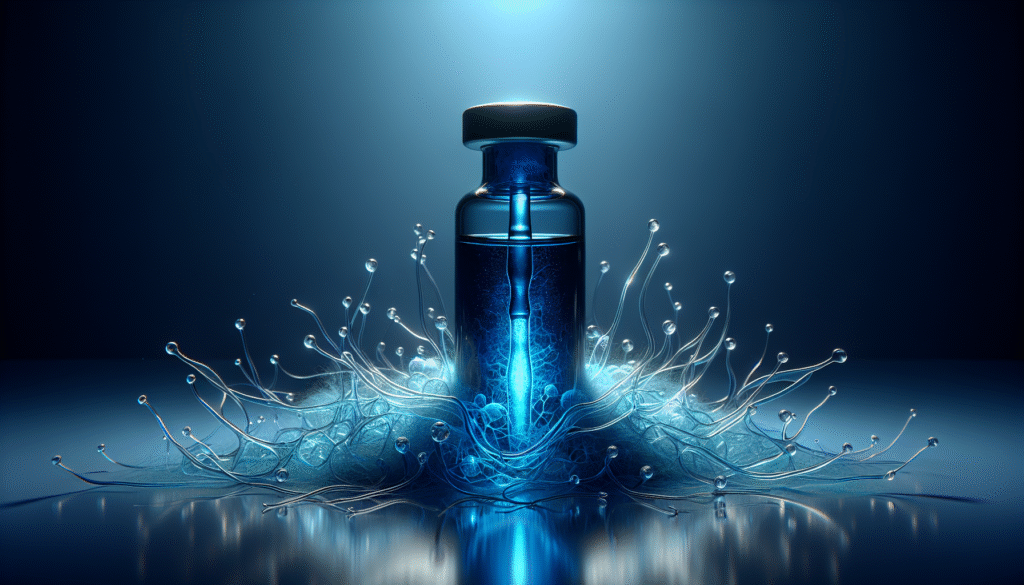
What if there was a compound with the potential to rejuvenate your skin and enhance your overall health?

Understanding Collagen and Its Importance
Collagen is a vital protein that serves as a primary building block for your skin, tendons, ligaments, and muscles. It provides elasticity and structure, making it a crucial player in maintaining youthful and healthy skin. As you age, collagen production naturally declines, leading to signs of aging such as wrinkles, sagging skin, and reduced elasticity.
Understanding the necessity of collagen can empower you to take proactive steps in maintaining your skin’s integrity. It’s not merely about aesthetics; the health of your skin can reflect your overall well-being.
The Role of Methylene Blue
Methylene blue is a synthetic dye that has gained attention in the medical and cosmetic fields due to its unique properties. Initially used in dyes and as an antiseptic, recent research has suggested potential benefits in enhancing cellular functions. The compound has antioxidant properties and is believed to improve mitochondrial function, which could be advantageous for collagen production.
Before exploring the mechanisms through which methylene blue can boost collagen, it’s essential to recognize the various applications of this compound in health and medicine.
How Methylene Blue Affects Collagen Synthesis
The Mechanism Behind Methylene Blue’s Benefits
Methylene blue influences collagen production through several mechanisms. Notably, it affects cellular respiration and energy production in mitochondria. Enhanced mitochondrial function may lead to improved fibroblast activity, which plays a crucial role in collagen synthesis.
Fibroblasts, the cells responsible for producing collagen, flourish in a well-oxygenated environment. Methylene blue can facilitate oxygen transportation at the cellular level, ensuring that fibroblasts receive the necessary energy and resources to produce collagen efficiently.
Enhancing Cellular Metabolism
By enhancing oxygen utilization in cells, methylene blue can help elevate overall cellular metabolism. This increased metabolism may lead to improved fibroblast proliferation and activity, thereby boosting collagen production. Higher rates of collagen synthesis contribute to a more resilient skin structure, which can counteract signs of aging.
Reducing Oxidative Stress
Oxidative stress is one of the main culprits in collagen degradation. It occurs when there’s an imbalance between free radicals and antioxidants in your body. Methylene blue functions as an antioxidant, neutralizing free radicals and reducing oxidative damage. By mitigating oxidative stress, methylene blue helps preserve existing collagen and supports the formation of new collagen.
Methylene Blue and Wound Healing
Research suggests that methylene blue may promote wound healing, a process closely associated with collagen production. When skin injuries occur, the body initiates a healing response that includes increased collagen synthesis. Methylene blue’s role in enhancing cellular function can speed up this process, leading to quicker recovery times and improved skin integrity.
The Science of Methylene Blue
Research Findings
Several studies have investigated methylene blue’s effect on human health, particularly its role in mitochondrial function and cellular repair. One study indicated that treating cultured skin fibroblasts with methylene blue resulted in increased mitochondrial activity and collagen production. Another research highlighted its potential in treating skin conditions like psoriasis and eczema, although further studies are necessary to establish comprehensive benefits.
Key Studies on Methylene Blue
Here’s a brief overview of significant research regarding methylene blue and collagen effects:
| Study | Findings |
|---|---|
| Study 1: Mitochondrial Function | Increased mitochondrial activity leads to enhanced collagen synthesis in fibroblasts. |
| Study 2: Wound Healing | Methylene blue speeds up wound healing by promoting fibroblast function. |
| Study 3: Antioxidant Properties | Proven capacity to reduce oxidative stress, preserving collagen integrity. |
These findings suggest a strong correlation between methylene blue use and increased collagen production, but it’s crucial to approach these results thoughtfully.
How to Incorporate Methylene Blue
Forms of Methylene Blue
Methylene blue is available in various forms, including topical applications, oral doses, and injectable solutions. Topical applications are particularly appealing for skin health, as they target the areas where collagen support is crucial.
Topical Formulations
Topical creams or serums that contain methylene blue can directly benefit skin health. These formulations may enhance collagen production, improve skin elasticity, and provide antioxidant protection. When considering a topical product, look for those with methylene blue concentration between 0.1% to 0.5%.
Oral Supplements
While some may consider oral supplements containing methylene blue, it is imperative to consult with a healthcare professional first. The effectiveness, dosage, and safety of such supplements should be evaluated based on individual health conditions.
Recommended Usage
Whether you decide to use methylene blue topically or orally, adherence to recommended guidelines is essential to avoid adverse effects. When applying topical formulations, start with a patch test to ensure no skin sensitivity occurs. Applying a small amount and waiting 24 hours can help mitigate potential reactions.

Precautions and Considerations
Potential Side Effects
It’s critical to be aware of the potential side effects associated with methylene blue. These may include skin irritation, discoloration at the application site, and systemic effects in higher doses. Monitoring your body’s response whenever introducing a new compound is a standard best practice.
Interactions with Other Medications
Methylene blue can interact with certain medications, particularly those affecting serotonin levels. If you are on antidepressants or other relevant medications, consult a healthcare professional before incorporating methylene blue into your routine.
Complementary Practices for Collagen Boosting
A Holistic Approach to Skin Health
While methylene blue shows promising effects on collagen production, it’s essential to adopt a holistic approach to skin health. Incorporating additional practices can optimize results and promote overall well-being.
Nutrition
Your diet plays a significant role in collagen synthesis. Consuming collagen-rich foods such as bone broth, fish, dairy, and egg whites can provide your body with the amino acids necessary for collagen production. Additionally, Vitamin C is crucial for collagen synthesis, and incorporating citrus fruits, bell peppers, and leafy greens can bolster this process.
Hydration
Adequate hydration is essential for maintaining skin elasticity. Drinking plenty of water throughout the day supports skin integrity and can aid in collagen maintenance. Aim for at least eight glasses a day, adjusting based on your activity levels and individual needs.
Sun Protection
Excessive sun exposure can significantly degrade collagen in the skin. Using sunscreen with an adequate SPF, along with wearing protective clothing, can shield your skin from harmful UV rays and prevent premature aging.
Lifestyle Changes
Incorporating lifestyle changes such as regular exercise, adequate sleep, and stress management can improve overall skin health. Exercise enhances circulation, which promotes better nutrient delivery to skin cells and supports collagen production.
Skin Care Routines
Evaluate your current skincare routine to ensure it focuses on nourishing and protecting your skin. Look for products containing retinoids, peptides, and antioxidants that complement the actions of methylene blue in boosting collagen production.
Final Thoughts
Consider the potential impact of methylene blue on your skin’s health and collagen production. With its promising effects and supporting evidence, this compound may serve as a valuable addition to your skincare regimen. However, understanding how it fits into a broader context of skin health is essential. Prioritizing nutrition, hydration, sun protection, and a consistent skincare routine will ensure a comprehensive approach.
While continuing research will further elucidate the benefits and applications of methylene blue, being informed about its properties allows you to make empowered decisions for your skin health. Always remember to consult healthcare professionals before introducing new elements into your wellness routine.
With informed practices and a holistic philosophy towards skin health, you can harness the benefits of methylene blue and embrace a more youthful, vibrant you.